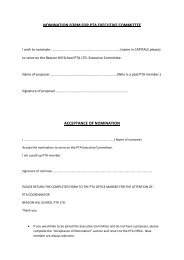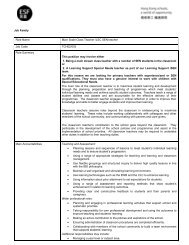InCAS Info for Parents (Y3/5) - Beacon Hill School
InCAS Info for Parents (Y3/5) - Beacon Hill School
InCAS Info for Parents (Y3/5) - Beacon Hill School
Create successful ePaper yourself
Turn your PDF publications into a flip-book with our unique Google optimized e-Paper software.
<strong>InCAS</strong>InteractiveComputerisedAssessmentSystem
Ask lots ofquestions athome
Spend timelistening to mychild
Try to learnfrom my child
Learning moreaboutassessment
Not makejudgementswithoutunderstanding thecontext of thework
Focus more onthe ‘process’rather than the‘product’
What assessmentsdo you think wehave on your child?
I value assessment because ...•Understand strengths andweaknesses•Standard of child compared toothers•Valuable measurement tool•Share their achievement•Tool <strong>for</strong> improvement
Aims:•To learn what the <strong>InCAS</strong>assesses•To learn what the <strong>InCAS</strong> is•To learn how we use the<strong>InCAS</strong> data
What does <strong>InCAS</strong> Assess?•Word Recognition•Word Decoding•Comprehension•Spelling•General Mathematics•Mental Arithmetic•Picture Vocabulary•Non-verbal Ability•Attitudes
<strong>InCAS</strong> is Computer AdaptiveHow It WorksEasyDifficultAge1 st QuestionX X X XXX X X
Are any of the questions UK specific? E.g. pounds andpence, or general UK knowledge? Our students are morethan 90% of non-European or non-American origin.Although there might be some cultural differences in howpupils respond to a few Maths and Science items, as theseassessments are adaptive, it is not the number of itemsanswered correctly that counts <strong>for</strong> a pupil's score, but thelevel of difficulty achieved. So a few items in anyone'sassessment which may be outside their experience - on anytopic - will make very little difference to their score. As <strong>for</strong>the Reading, we have done some analysis on our <strong>InCAS</strong>vocabulary test <strong>for</strong> 5-11 year olds, comparing theper<strong>for</strong>mance of children in the UK against that of a group ofpupils in Hong Kong international schools. There were fewbiased words, and of these some were easier <strong>for</strong> Hong Kongpupils and some were easier <strong>for</strong> UK pupils, evening out theirscores. We plan to do a similar analysis on assessments <strong>for</strong>secondary age pupils.
What exactly is Developed Ability?Developed ability is the ability of children to learn. It issomething that they have developed over their lifetime andthat they will continue to develop. We measure it using acombination of their language acquisition (picture vocabulary)and a non-verbal test.Aren't you using the old IQ ideas?We certainly do not believe that children are born with acertain fixed intelligence that determines the rest of theirlives. We all develop in a world where people and the thingsaround us interact with our changing intellect so that we canreasonably talk about "developed ability" as being somethingwhich indicates the position which a child has reached. Thiscan help teachers to judge the kind of work and progresswhich is appropriate. <strong>InCAS</strong> assesses this using a culturedominated vocabulary assessment and a culture-freeassessment - POP (Problems of Position).
What in<strong>for</strong>mationdoes <strong>InCAS</strong> givethe teachers?How is the dataused?
What in<strong>for</strong>mationwill I receive asa parent?
Benefits•Identify student/class/school strengths andweaknesses•Help identify gifted and talented students•Know students’ strengths and weaknesses so thatwe can identify possible solutions andinterventions•Help identify those students that may needadditional support or more challenging teaching•Set meaningful, achievable targets•Compare students’ per<strong>for</strong>mance against similarstudents elsewhere



